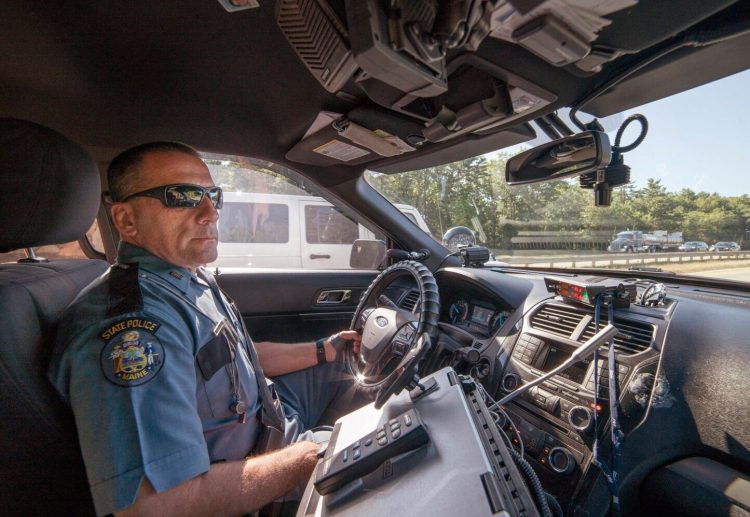Eagle-eyed police officers across Maine have written 232 tickets under the state’s new law prohibiting drivers from using hand-held electronic devices while behind the wheel, a rate that has exceeded analysts’ predictions so far.
Since the law took effect Sept. 19, 54 of the motorists have admitted to the violation and have agreed to pay the $85 fine and fees, while 32 motorists say they plan to contest the tickets in court, according to the state Violations Bureau, a division of the judicial branch that handles traffic-related infractions.
Any motorist who receives a ticket has 35 days from the date of the violation to admit to the infraction and pay the fine, or ask for a court date and fight the infraction. The remaining 146 drivers who received violations under the hands-free law have yet to respond to the citation in writing within the allowable time period, judiciary spokeswoman Julia Finn said.
At the current rate, police would write more than 1,800 tickets before the end of the state fiscal year June 30, or about 700 more tickets than legislative analysts predicted when the law was up for debate in Augusta last summer.
The burst of activity was not entirely surprising to Windham police Capt. William Andrew, who said he suspects fewer drivers will be cited in the future as they adjust to using hands-free technology in their cars, or decide simply to put the phone down and drive.
“Any time you take on new enforcement action, you will inflate those numbers, because there’s something new,” said Andrew, whose officers have written eight tickets for cellphone infractions so far. “When we first started doing the seat belt campaigns, it was very easy to find the violations, and now it’s harder.”
Legislative analysts predicted that in the first full fiscal year that ends June 30, 2021, police could write 5,500 citations, or about 458 tickets per month, worth an estimated $517,000 in new revenue that will supplement the state transportation budget and bring in an additional $82,700 in fees. By comparison, police wrote about 1,600 tickets for texting while driving in 2018, resulting in more than 1,300 convictions.
Police only need to see a cellphone in a driver’s hand to initiate a stop and write a $50 ticket for someone’s first offense. With added fees, the total amount due for first-time offenders who do not fight the ticket in court is $85.
Subsequent offenses are far steeper, at $325, including fees.
Police in South Portland said that drivers snapped into compliance, at least when police were nearby.
“Officers have remarked to me that almost immediately people were coming into compliance with the new law,” said South Portland police Sgt. John Sutton.
Drivers are allowed to interact with phones or electronic devices using a single push, tap or swipe, if the devices are secured to a mount or a cradle somewhere on the vehicle that does not interfere with the driver’s view of the roadway. Drivers are permitted and encouraged to use integrated hands-free calling systems or aftermarket Bluetooth devices to make and receive calls hands-free.
In Augusta, police say they have written three summonses so far, and have issued far more warnings, said Sgt. Christian Behr.
“We don’t see as many (people on their phones), and when we do, we’re still issuing a lot of warnings,” Behr said. Because the city is relatively densely populated, Augusta officers spend most of their time attending to calls for service, and less time watching traffic.
Behr said he expects to see more ticket-writing activity if Augusta receives grants for traffic details, in which state or federal funds are earmarked for overtime shifts to target specific problems, such as distracted driving.
The law marks a shift from years of legislative hand-wringing and disapproval of similar bills, which were at times viewed by lawmakers as an effort to legislate common sense. Former Gov. Paul LePage vetoed a similar measure in 2017 after it passed both houses of the Legislature, calling it an attempt at “social engineering.”
Maine’s new statute is in line with laws already on the books in New Hampshire, Vermont, Connecticut and Rhode Island, making Massachusetts the only New England state without a hand-held cellphone ban. A total of 19 other states and the District of Columbia also bar cellphone use for anyone behind the wheel.
Using phones behind the wheel is believed to be one of the leading causes of distracted-driving crashes, which killed at least 3,160 people on American roads in 2017, according to the National Highway Traffic Safety Administration.
Send questions/comments to the editors.




Comments are no longer available on this story